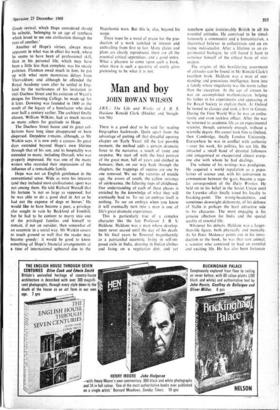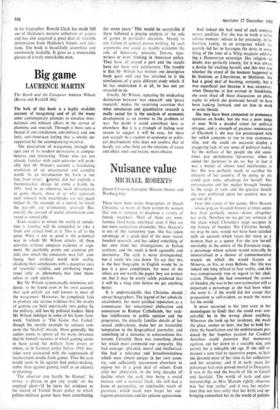Man and boy
JOHN ROWAN WILSON
There is a good deal to be said for reading biographies backwards. Quite apart from the advantage of putting off that dreadful opening chapter on 'Early Years' till the last possible moment, the method adds a certain dramatic force to the narrative, a touch of irony and suspense. We start off with the final portrait of the great man, full of years and clothed in honours; then, on our way back through the chapters, the trappings of success are one by one removed. We see the victories of middle age, the errors of youth, the callow strivings of adolescence, the faltering steps of childhood. Our understanding of each of these phases is enriched by the knowledge of what they will eventually lead to. To see an embryo itself is nothing. To see an embryo when you know it will eventually turn into a man is one of life's great dramatic experiences.
This is particularly true of a complex character like the late Professor J. B. S. Haldane. Haldane was a man whose develop- ment never ceased until the day of his death. In his final years he flowered magnificently as a patriarchal eccentric, living in self-im- posed exile in India, dressing in Indian clothes and living on a vegetarian diet, and yet
somehow quite irretrievably British in all his essential attitudes. He contrived to be simul-
taneously a communist and a humanitarian, a theoretical believer in collectivism and an ex- treme individualist. After a lifetime as an ex- perimental biologist, he still found it hard to convince himself of the ethical basis of vivi- section.
The origins of this bewildering assortment of attitudes can be found in Mr Ronald Clark's excellent book. Haldane was a man of out- standing and precocious intelligence, born into a family where singularity was the norm rather than the exception. At the age of sixteen he was an accomplished mathematician, helping his father in his experiments and appearing at the Royal Society to explain them. At Oxford he turned to classics and took a first in Greats. During the First World War he was an enthu- siastic and even reckless officer. After the war he returned to academic life as an experimental scientist, though, curiously enough, without a scientific degree. His career took him to Oxford, then Cambridge, finally London University. Everywhere he was in conflict with authority —over his work, his politics, his sex life. He attracted a small band of devoted followers and antagonised or exasperated almost every- one else with whom he had dealings.
The volume of his writings was prodigious. He acquired a world reputation as a popu- lariser of science and, with his conversion to communism between the wars. became a regu- lar correspondent of the Daily Worker. He held on to his belief in the Soviet Union until the Lysenko affair finally taxed his loyalty to breaking-point. The wrong-headedness, and sometimes downright dishonesty, of his defence of Stalin is perhaps the least attractive side to his character. The most engaging is his genuine affection for India and the special quality of oriental life.
Whatever his defects, Haldane was a larger- than-life figure, both physically and mentally. As Sir Peter Medawar points out in his intro- ductirn to the book, he was that rare animal, a scientist who contrived to lead an eventful and exciting life. He has also been fortunate
in his biographer. Ronald Clark has made full use of Haldane's massive collection of papers and has also acquired a great deal of valuable information from Haldane's friends and rela- tions. The book is beautifully assembled and enormously readable. It gives us a memorable picture of a truly remarkable man.



































 Previous page
Previous page